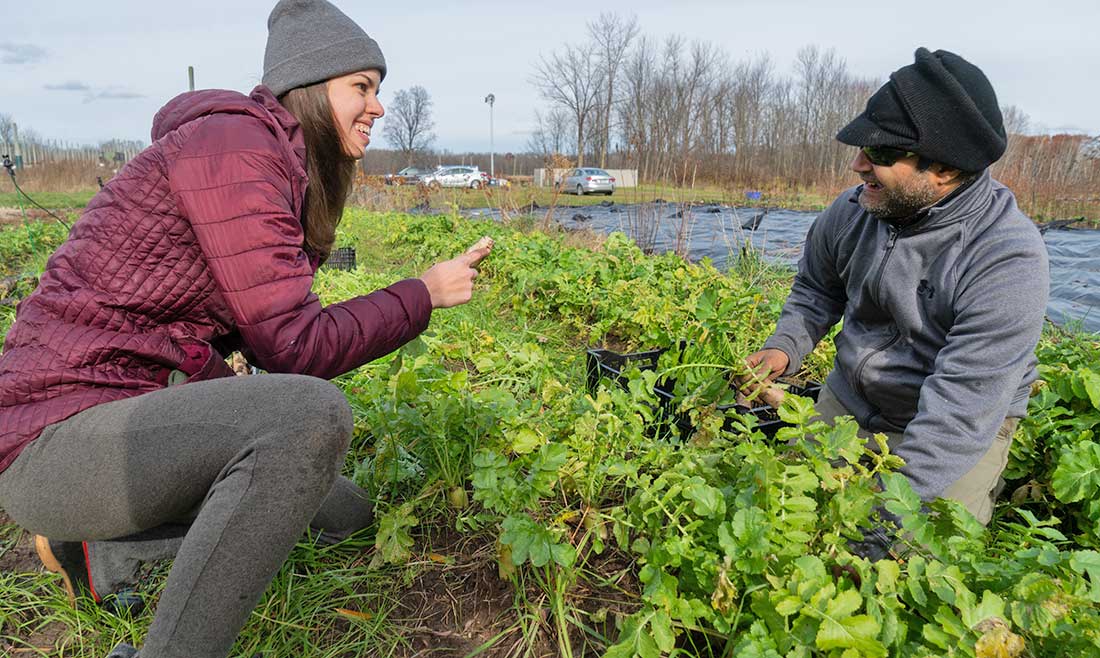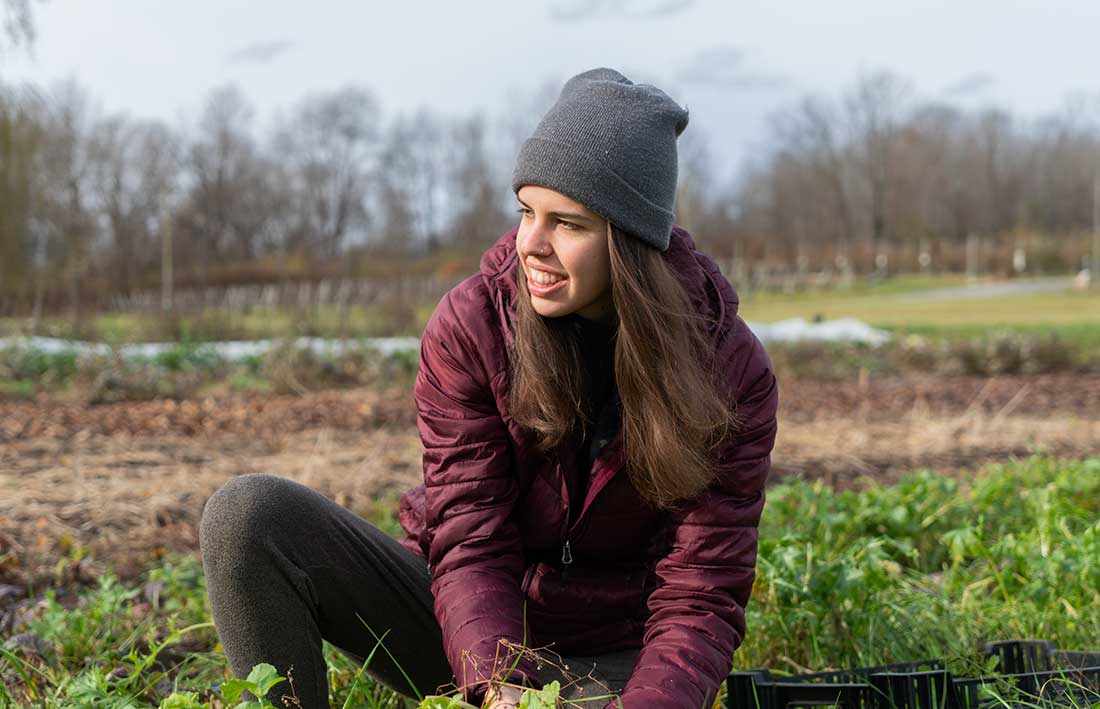
Growing up in Poughkeepsie in the Hudson River Valley region, Anna Zoodsma enjoyed foraging for berries with her father, cooking and baking, and “being creative with food.” When she started working on farms after graduating from high school, she was able to connect her love of the outdoors with her love of food.
“As I learned more about things such as agroecology, seed sovereignty and farm worker experiences, I began to see how our whole world is connected through food, Zoodsma says. “So many things I care about–the natural environment, the humans around me, justice–are deeply intertwined with food systems.”
Zoodsma, who received her undergraduate degrees in environmental science and geography from SUNY Oneonta, is working toward her master’s in Food Studies at Falk College with a Certificate of Advance Study in Civil Society Organizations from the Maxwell School of Citizenship and Public Affairs.

In her limited spare time as a graduate student, teaching assistant and research assistant, Zoodsma likes to cook, read and explore the outdoors, and she found a few minutes to chat with us about her experience at Falk, volunteering at Salt City Harvest Farm in Kirkville, and her future plans.
Why did you choose Syracuse University?
Though I am originally from New York, for a few years before this program I was farming in Colorado and then guiding wilderness canoe trips in Florida. When COVID arrived, I applied to a few places but thought being back in New York and closer to my family might make sense. I was impressed by the Food Studies program at Syracuse so after receiving a TA position and speaking with a few folks in the department, I decided it was a good next step for me.
What’s your favorite class?
Food and Public Policy. This class looks at the policy decisions that have created the food system that exists today. It has been helpful to look at why the food system operates as it does, and practically assess the tools available to move from point A to point B in the food system. This class grounds some of the more theoretical sides of food system work.
Tell me about something special from your Syracuse experience.
Since coming to Syracuse I have learned how to cross-country ski! Last winter was the perfect storm, with limited options for things to do during COVID, a search for a winter hobby to support my mental health and living in a snowy place all coming together for me in the form of cross-country skiing. My favorite place to cross-country ski is at Highland Forest (in Fabius), but I have also enjoyed working as a cross-country ski attendant at Drumlins (Country Club) though the Recreation Services department at SU.
What do you do at Salt City Harvest Farm?
I am completing my practicum for the Food Studies program at Salt City Harvest, a local organization that provides farmland to New Americans in Syracuse. There are a couple of different parts involved with my practicum. For one, I am conducting ethnographic research that looks at how farming practices are related to community mental health. This involves volunteering and experiencing day-to-day farm activities, interviewing farmers about their experiences, and interviewing professionals who work in fields such as human rights, farming and mental health about these topics. My research may end in an academic publication, but it is largely meant to provide Salt City Harvest with a deeper understanding of farmers’ desires for the future, and to leverage future funding for the farm through a clearer articulation of the value of farming for those involved at Salt City Harvest.
With the farming season completed for the year as the seasons change, I am now analyzing the data I have collected and working on organizational planning work, such as sorting through possible grants to apply for and working with an advisory committee to hopefully have some new programing at the farm in the future!
What’s something you’ve learned at Salt City Harvest that has stuck with you?
One thing that is special about Salt City Harvest is the sense of community that is present. Though farmers are from a vast number of countries and speak a variety of languages, there is a strong sense of community present at the farm. Community is not reliant on an ability to communicate in the same language. Farmers mostly have individual plots but help one another out, share produce and share meals.
It’s a space that allows many to feel safe, continue their own traditions, and share a common goal. I think that this space of community is a huge strength and a reason farmers come back and do the hard work of farming every week. From my experience, this dynamic is something I find incredibly valuable and supportive, and something I will continue to seek out and seek to create in workplaces or neighborhoods I am involved in in the future.
What’s one thing people should know about the food system?
I think everyone needs to know that their food is a product of a long and winding history. To me, that means that the food I am eating is influenced by a huge array of factors, such as centuries of seed-saving practices, the interests of multi-national corporations, and historic land ownership, among other things.
It also means that the food I eat influences a huge array of factors such as my personal health, the livelihoods and safety of workers involved in producing it, and the climate, among other things. Being aware and being an active player in the food system is a massive way that we each can cultivate valuable changes both in our own lives, and in the world. An individual’s food choices, and the food choices that are available to them, are deeply historic, political and impactful.
What’s next for you?
I’m not sure what’s next for me! I am most passionate about and have spent most of my time at SU working on issues related to farm workers and farmer rights and would love to keep doing that type of work. I still have lots to figure out at this point, though!
What’s the most important thing you want to accomplish in your food studies career?
I want to bring hope to others. In my experiences as a student in environmental science and food studies programs, the topics I study can often look pretty grim and take a toll on you. But I also know that the times in my life that I have felt most passionate and inspired have been times I have felt connected with my natural environment and to the food that I am growing or preparing.
I think hope and persistence are huge tools of growth and are a light that I want to shine for others in food system spaces. That doesn’t mean blindly moving through the world without addressing injustices or practical limits, but it does mean envisioning a world that is different than the one we are in now and living your life to bring that reality a bit more into focus.
—Matthew Michael and Valerie Pietra
